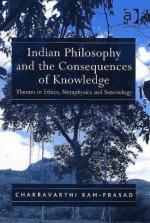|
This section contains 1,147 words (approx. 4 pages at 300 words per page) |

|
PURUṢA is a Sanskrit word meaning "person" or "a man." Throughout Indian intellectual history the term has acquired the independent meanings of "the first man, self," and "consciousness." The development of the concept of puruṣa therefore overlaps with the development of the concepts of ātman ("self"), brahman ("universal self"), and kṣetrajña ("knower"). The interrelationships among these concepts can be traced through the literature of the Upaniṣads and the epics, in the work of the Buddhist writer Aśvaghoṣa, in the medical work of Caraka, and in the texts of the Sāṃkhya school.
Puruṣa first occurs in the oldest extant book of Vedic hymns, the Ṛgveda (c. 1200 BCE). Hymn 10.90 refers to the first man from whose bodily parts sprang the different groups of society (varṇas) based on the division of labor. In the...
|
This section contains 1,147 words (approx. 4 pages at 300 words per page) |

|


